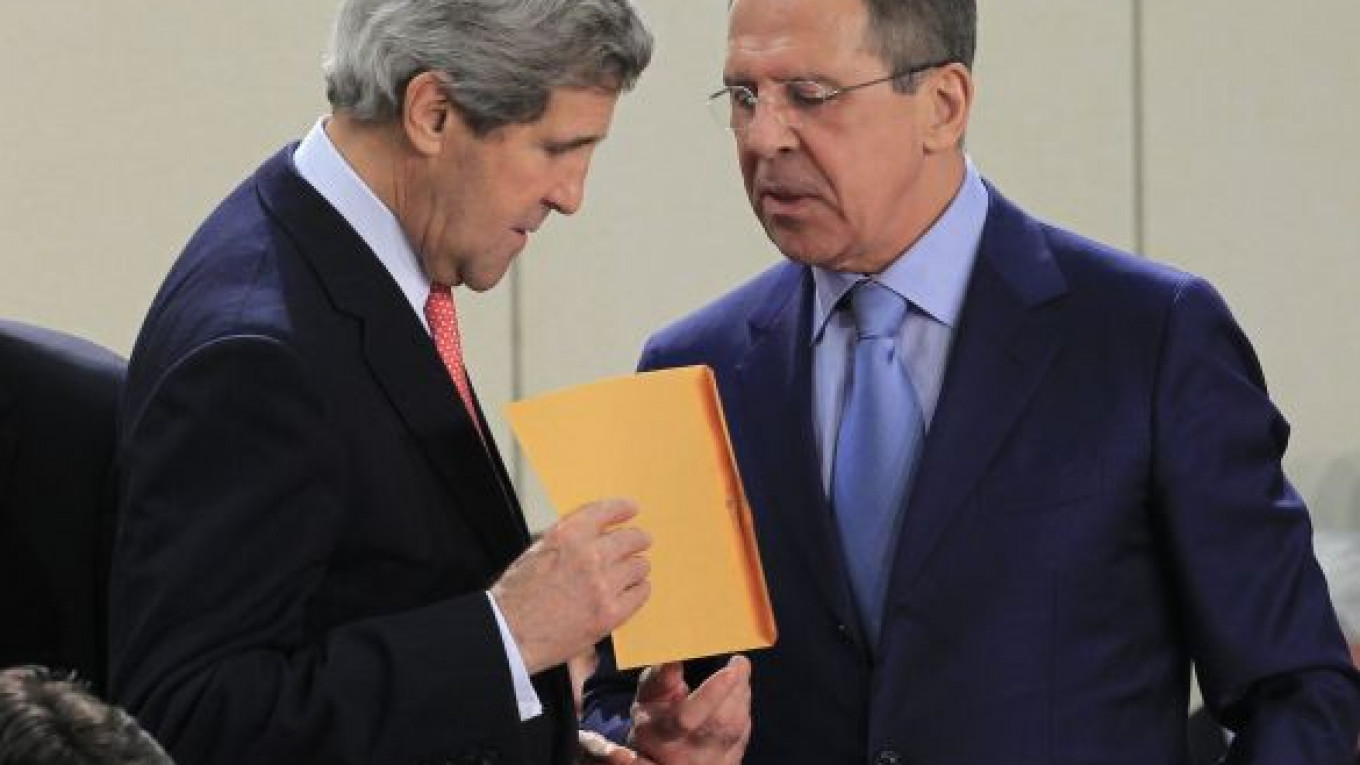Russia has accused Britain and France of throwing a political wrench in the wheels of a proposal to send United Nations inspectors to investigate the use of chemical weapons in war-torn Syria, which President Barack Obama has said would be a "game changer" and hinted could draw intervention.
"Under continued pressure from certain Western members of the Security Council, the general secretary has not dispatched the experts, and I consider this absolutely unacceptable. It's an attempt to politicize the issue," Foreign Minister Sergei Lavrov told reporters on Tuesday in Brussels.
Speaking after a meeting with NATO foreign ministers, including U.S. counterpart John Kerry, Lavrov said chemical weapons inspectors should only be allowed to look into specific allegations and not be permitted to operate freely throughout the country, which would be "a little too much."
Although he didn't refer to them by name, Lavrov was almost certainly referring to Britain and France, which have pressed for UN inspectors to be allowed to investigate what they say is credible evidence that the government has used chemical weapons in Aleppo, Homs and possibly Damascus.
The foreign minister says allowing weapons inspectors to operate freely as Britain and France want would be "a little too much."
That position appeared to get a boost on Tuesday, when Israel for the first time accused President Bashar Assad's forces of likely attacking rebels with sarin, a lethal nerve agent, and less lethal chemicals, a senior Israeli military intelligence officer told a security conference in Tel Aviv.
Israeli Prime Minister Benjamin Netanyahu could not confirm the allegation during a Tuesday morning telephone conversation, Kerry told reporters. But America's top diplomat called for the 28-member alliance to prepare a plan for the possible use of chemical weapons.
The Syrian government and rebels have accused each other of using chemical weapons during a battle near Aleppo in March, and Assad has agreed to allow UN inspectors to investigate that particular incident, but not alleged chemical attacks elsewhere.
Widely seen as Assad's strongest foreign backer, Russia has called for ?dialogue and resisted foreign intervention in the two-year-old conflict, finding itself at odds with the U.S. and other Western countries that have long since declared the current government illegitimate.
NATO Secretary General Anders Fogh Rasmussen said "the situation in Syria has dramatically deteriorated" and "continues to pose a threat to regional stability," and Kerry called on NATO members to boost material and political support to the Syrian opposition.
More than 70,000 have died in the Syrian war, according to the United Nations, and more than 1 million Syrians have fled the country.
The NATO-Russia Council summit was also the first meeting between high-level U.S. and Russian officials since last week's gruesome double bombing at the Boston Marathon, which investigators have blamed on two ethnic Chechens with links to Russia's troubled North Caucasus region.
Kerry said the two countries were working together to find out more about ties between the suspects — brothers Tamerlan and Dzhokhar Tsarnaev — their family, and Russia, including the details of a six-month trip Tamerlan took to Dagestan and Chechnya last year, during which time he may have linked up with Islamist insurgents active in the area.
Homeland Security Secretary Janet Napolitano told Senators in Washington on Tuesday that her agency was aware of the trip even though Tamerlan's name was misspelled on a travel document. A key lawmaker had said that the misspelling caused the FBI to miss the trip.
Before their meeting, Lavrov presented Kerry with a manila folder containing what appeared to be photographs and documents. A senior U.S. official traveling with Kerry said the contents were unrelated to the bombing investigation and were merely photographs of the two men at their last meeting in London.
U.S. and NATO plans to build an anti-missile shield around Western Europe were also discussed, and Russia is studying changes to the U.S. missile defense program, but still wants guarantees that the system would not be used against Russia, Lavrov said.
Washington says the shield would be designed to protect against attacks from Iran and North Korea, but Russia fears the system's interceptors could eventually shoot down its long-range nuclear missiles.
The Pentagon said last month it would station additional missile interceptors in Alaska in response to North Korean threats and at the same time forgo a new type of interceptor that would have been deployed in Europe.
Material from Reuters and the Associated Press is included in this report.
Contact the author at [email protected]
Related articles:
A Message from The Moscow Times:
Dear readers,
We are facing unprecedented challenges. Russia's Prosecutor General's Office has designated The Moscow Times as an "undesirable" organization, criminalizing our work and putting our staff at risk of prosecution. This follows our earlier unjust labeling as a "foreign agent."
These actions are direct attempts to silence independent journalism in Russia. The authorities claim our work "discredits the decisions of the Russian leadership." We see things differently: we strive to provide accurate, unbiased reporting on Russia.
We, the journalists of The Moscow Times, refuse to be silenced. But to continue our work, we need your help.
Your support, no matter how small, makes a world of difference. If you can, please support us monthly starting from just $2. It's quick to set up, and every contribution makes a significant impact.
By supporting The Moscow Times, you're defending open, independent journalism in the face of repression. Thank you for standing with us.
Remind me later.


